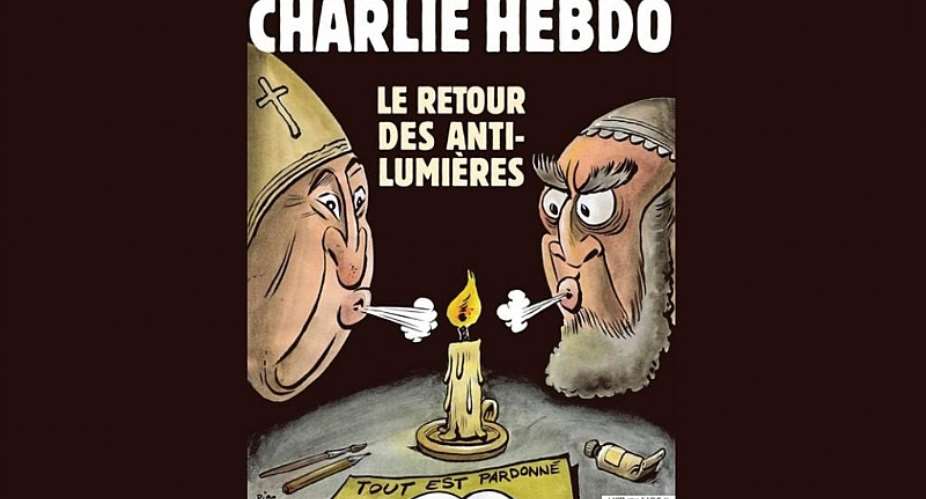On 7 January 2015, two gunmen burst into the offices of French satirical weekly Charlie Hebdo, killing twelve people. Today, the effects of the attack are still felt and accomplices of the perpetrators are still at large.
The two Islamist gunmen killed chief editor and cartoonist Charb, along with staffers Cabu, Honoré, Tignous and Wolinski, Bernard Maris, Elsa Cayat and Mustapha Ourrad, along with guest Michel Renaud and maintenance worker Frédéric Boisseau. Two police officers, Franck Brinsolaro and Ahmed Merabet, were also killed and eleven wounded – four seriously.
Then President François Hollande called the assault a "terrorist attack of the most extreme barbarity".
The gunmen, Saïd and Chérif Kouachi, were French Muslim brothers of Algerian descent. They were shot and killed by police after a two-day manhunt, but many still wonder what impact the attack is having today.
Time to move on?
Charlie Hebdo says the story is over. "After four years, many people are already tired of it," says an editorial in the satirical weekly published on Saturday.
"Haven't you finished with it?" asks the editorial by cartoonist Riss (Laurent Sourisseau), one of the surviving journalists. "Perhaps you should move on!"
The editorial says this is not about "indifference", warning that populism and religion are "returning to political life". It says the principles of enlightenment, the age of reason, are under attack.
The front of the 5 January 2019 issue features a Catholic priest and an imam blowing out a candle, and the text "the return of anti-enlightenment."
Critics say that freedom of speech has come increasingly under attack since the Charlie Hebdo murders.
Some point out that after the "Je suis Charlie" protests – the slogan used to show solidarity with victims and support for press freedom – faded away, some even blamed the magazine for the attacks.
Glenn Greenwald, of The Intercept, the magazine that helped NSA Whistleblower Edward Snowden to publish his revelations about global snooping of the US intelligence agency, pointed out just months after the attack, in April 2015, that 204 PEN writers had objected in a signed letter against bestowing Charlie Hebdo with an award.
The letter said, "There is a critical difference between staunchly supporting expression that violates the acceptable, and enthusiastically rewarding such expression." It expressed concern that "by bestowing the Toni and James C. Goodale Freedom of Expression Courage Award on Charlie Hebdo, PEN is not simply conveying support for freedom of expression, but also valorizing selectively offensive material: material that intensifies the anti-Islamic, anti-Maghreb, anti-Arab sentiments already prevalent in the Western world."
Accomplice arrested after four years
In late December 2018, an accomplice of the Kouachi brothers was arrested.
Peter Cherif, 36, was close to the brothers, and suspected of being one of the masterminds of the 2015 attack.
French authorities had been seeking him since he disappeared in 2011 on the final day of his trial in Paris for fighting in Iraq alongside Al-Qaeda in 2004.
Cherif, who was sentenced to five years in prison in the trial, was arrested on 16 December in Djibouti after arriving from Yemen carrying fake ID.
He appeared before a French judge on 27 December and was charged with "terrorist conspiracy" before being returned to prison to serve a five-year sentence from his original trial.
Prosecutors have said he is not currently being held in connection with the Charlie Hebdo attack.
In 2017, investigators opened a new line of inquiry into his activities in Yemen where he joined the senior ranks of the local branch of Al-Qaeda known as AQAP, according to a source close to the case.
His wife, “Soulef A”, who was was arrested alongside Cherif and their two children in Djibouti, has been charged with "criminal association with terrorists" and "financing a terrorist enterprise", and held pending a hearing on 7 January, according to France 24 .
Just a week after Cherif's arrest, judicial sources told AFP that French prosecutors were calling for 14 people to be tried in connection with Charlie Hebdo murders.
It will be up to anti-terrorist judges to decide whether all 14 are tried.
Those likely to face trial are accused of "complicity" in assisting the attackers, including providing them with weapons.





 Western North been sidelined for far too long; address our needs before 2024 ele...
Western North been sidelined for far too long; address our needs before 2024 ele...
 Effutu: 'Stop eating at night and take care of your health' — Afenyo Markin advi...
Effutu: 'Stop eating at night and take care of your health' — Afenyo Markin advi...
 Akufo-Addo's desperate attempt to disrupt Yagbonwura's 1st year anniversary cele...
Akufo-Addo's desperate attempt to disrupt Yagbonwura's 1st year anniversary cele...
 Armed robbers attack, rob Sethi Brothers Ghana Limited in Tema
Armed robbers attack, rob Sethi Brothers Ghana Limited in Tema
 SML deal: We commend Manasseh for holding gov't to account, Akufo-Addo for not s...
SML deal: We commend Manasseh for holding gov't to account, Akufo-Addo for not s...
 Our recall invocation is in good faith to consider three key issues – Majority
Our recall invocation is in good faith to consider three key issues – Majority
 You’re inviting bad luck upon yourself if you use Indian hair — Spiritualist war...
You’re inviting bad luck upon yourself if you use Indian hair — Spiritualist war...
 Ejisu by-election: Police questions Kwadaso MP, two others over bribery allegati...
Ejisu by-election: Police questions Kwadaso MP, two others over bribery allegati...
 Nana Kwame Bediako is Nkrumah’s reincarnate; he’ll be president if he appoints N...
Nana Kwame Bediako is Nkrumah’s reincarnate; he’ll be president if he appoints N...
 Dumsor: Mahama gave us ‘dum, dum, dum’ but we are now in the era of ‘dum sie sie...
Dumsor: Mahama gave us ‘dum, dum, dum’ but we are now in the era of ‘dum sie sie...
